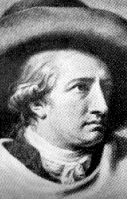Goethe's early education was somewhat irregular and informal, and already he was marked by that apparent feeling of superiority that stayed by him throughout his life. When he was about 16 he was sent to Leipzig, ostensibly to study law. He apparently studied more life than law and put in his time expressing his reactions through some form of writing. On at least two occasions, this form was dramatic. Finally, in 1770 Goethe went to Strassburg, this time really intent on passing his preliminary examinations in law, and with the somewhat more frivolous ambition of learning to dance. Along with his study of law, he studied art, music, anatomy and chemistry. A strong friendship with the writer, Herder, was likewise no part of Goethe's experience at this time, a contact which was of considerable importance in these formative years. In 1771 Goethe returned to Frankfurt, nominally to practice law, but he was soon deep in work on what was to be his first dramatic success,Götz von Berlichingen. While this was actually the story of a robber baron of the 16th century it really represented Goethe's youthful protest against the established order and his demand for intellectual freedom. Its success made its hitherto unknown author the literary leader of Germany. Goethe's invitation in 1775 to the court of Duke Karl August at Weimar was a turning point in the literary life of Germany. He became manager of the Court Theater, and interested himself in various other activities, so that for a period of some ten years not much actual writing was done. The writing of Faust, however, that best known of Goethe's works, extended over practically the whole of Goethe's literary life, a period of 57 years. It was finally finished when Goethe was 81. Faust is in reality a dramatic poem rather than a piece for the stage. While based on the same legend as Marlowe's Dr. Faustus, it far transcends both its legendary source and the English play. The latter is little more than a Morality illustrating the punishment of sin; Goethe's work is a drama of redemption. |
sábado, 24 de abril de 2010
Johann Wolfgang von Goethe
Subscrever:
Enviar feedback (Atom)

 THE boy, Goethe, was a precocious youngster. At the early age of eight he had already acquired some knowledge of Greek, Latin, French and Italian. He had likewise acquired from his mother the knack of story telling; and from a toy puppet show in his nursery his first interest in the stage.
THE boy, Goethe, was a precocious youngster. At the early age of eight he had already acquired some knowledge of Greek, Latin, French and Italian. He had likewise acquired from his mother the knack of story telling; and from a toy puppet show in his nursery his first interest in the stage.
Sem comentários:
Enviar um comentário